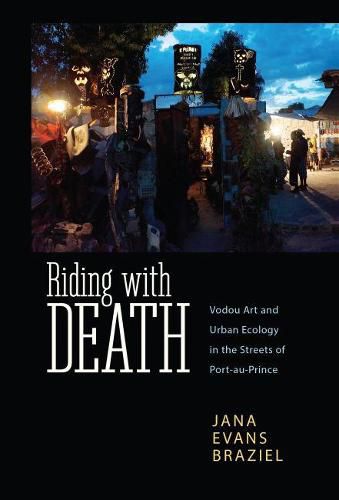Readings Newsletter
Become a Readings Member to make your shopping experience even easier.
Sign in or sign up for free!
You’re not far away from qualifying for FREE standard shipping within Australia
You’ve qualified for FREE standard shipping within Australia
The cart is loading…






This title is printed to order. This book may have been self-published. If so, we cannot guarantee the quality of the content. In the main most books will have gone through the editing process however some may not. We therefore suggest that you be aware of this before ordering this book. If in doubt check either the author or publisher’s details as we are unable to accept any returns unless they are faulty. Please contact us if you have any questions.
On the southern end of the Grand Rue, a major thoroughfare that runs through the center of Port-au-Prince, waits the Haitian capital’s automobile repair district. This veritable junkyard of steel and rubber, recycled parts, old tires, and scrap metal might seem an unlikely foundry for art. Yet, on the street’s opposite end thrives the Grand Rue Galerie, a working studio of assembled art and sculptures wrought from the refuse.
Established by artists Andre Eugene and Jean Herard Celeur in the late 1990s, the Grand Rue’s urban environmental aesthetics-defined by motifs of machinic urbanism, Vodou bricolage, the postprimitivist altermodern, and performative politics–radically challenge ideas about consumption, waste, and environmental hazards, as well as consider innovative solutions to these problems in the midst of poverty, insufficient social welfare, lack of access to arts, education, and basic needs.
In Riding with Death, Jana Evans Braziel explores the urban environmental aesthetics of the Grand Rue sculptors and the beautifully constructed sculptures they have designed from salvaged automobile parts, rubber tires, carved wood, and other recycled materials. Through first-person accounts and fieldwork, Braziel constructs an urban ecological framework for understanding these sculptures amid environmental degradation and grinding poverty. Above all, Braziel presents Haitian artists who live on the most challenged Caribbean island, yet who thrive as creators reinventing refuse as art and resisting the abjection of their circumstances.
$9.00 standard shipping within Australia
FREE standard shipping within Australia for orders over $100.00
Express & International shipping calculated at checkout
This title is printed to order. This book may have been self-published. If so, we cannot guarantee the quality of the content. In the main most books will have gone through the editing process however some may not. We therefore suggest that you be aware of this before ordering this book. If in doubt check either the author or publisher’s details as we are unable to accept any returns unless they are faulty. Please contact us if you have any questions.
On the southern end of the Grand Rue, a major thoroughfare that runs through the center of Port-au-Prince, waits the Haitian capital’s automobile repair district. This veritable junkyard of steel and rubber, recycled parts, old tires, and scrap metal might seem an unlikely foundry for art. Yet, on the street’s opposite end thrives the Grand Rue Galerie, a working studio of assembled art and sculptures wrought from the refuse.
Established by artists Andre Eugene and Jean Herard Celeur in the late 1990s, the Grand Rue’s urban environmental aesthetics-defined by motifs of machinic urbanism, Vodou bricolage, the postprimitivist altermodern, and performative politics–radically challenge ideas about consumption, waste, and environmental hazards, as well as consider innovative solutions to these problems in the midst of poverty, insufficient social welfare, lack of access to arts, education, and basic needs.
In Riding with Death, Jana Evans Braziel explores the urban environmental aesthetics of the Grand Rue sculptors and the beautifully constructed sculptures they have designed from salvaged automobile parts, rubber tires, carved wood, and other recycled materials. Through first-person accounts and fieldwork, Braziel constructs an urban ecological framework for understanding these sculptures amid environmental degradation and grinding poverty. Above all, Braziel presents Haitian artists who live on the most challenged Caribbean island, yet who thrive as creators reinventing refuse as art and resisting the abjection of their circumstances.